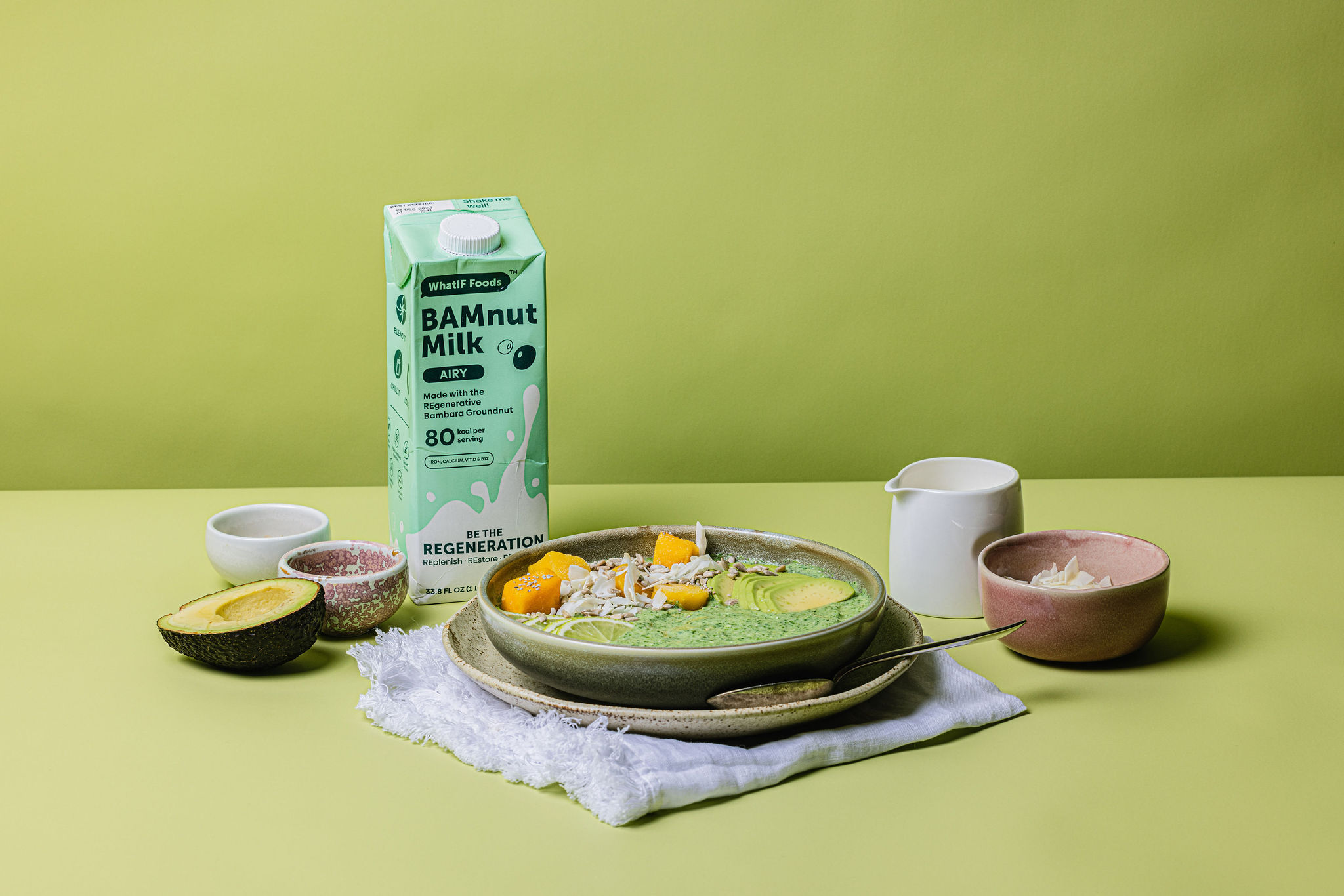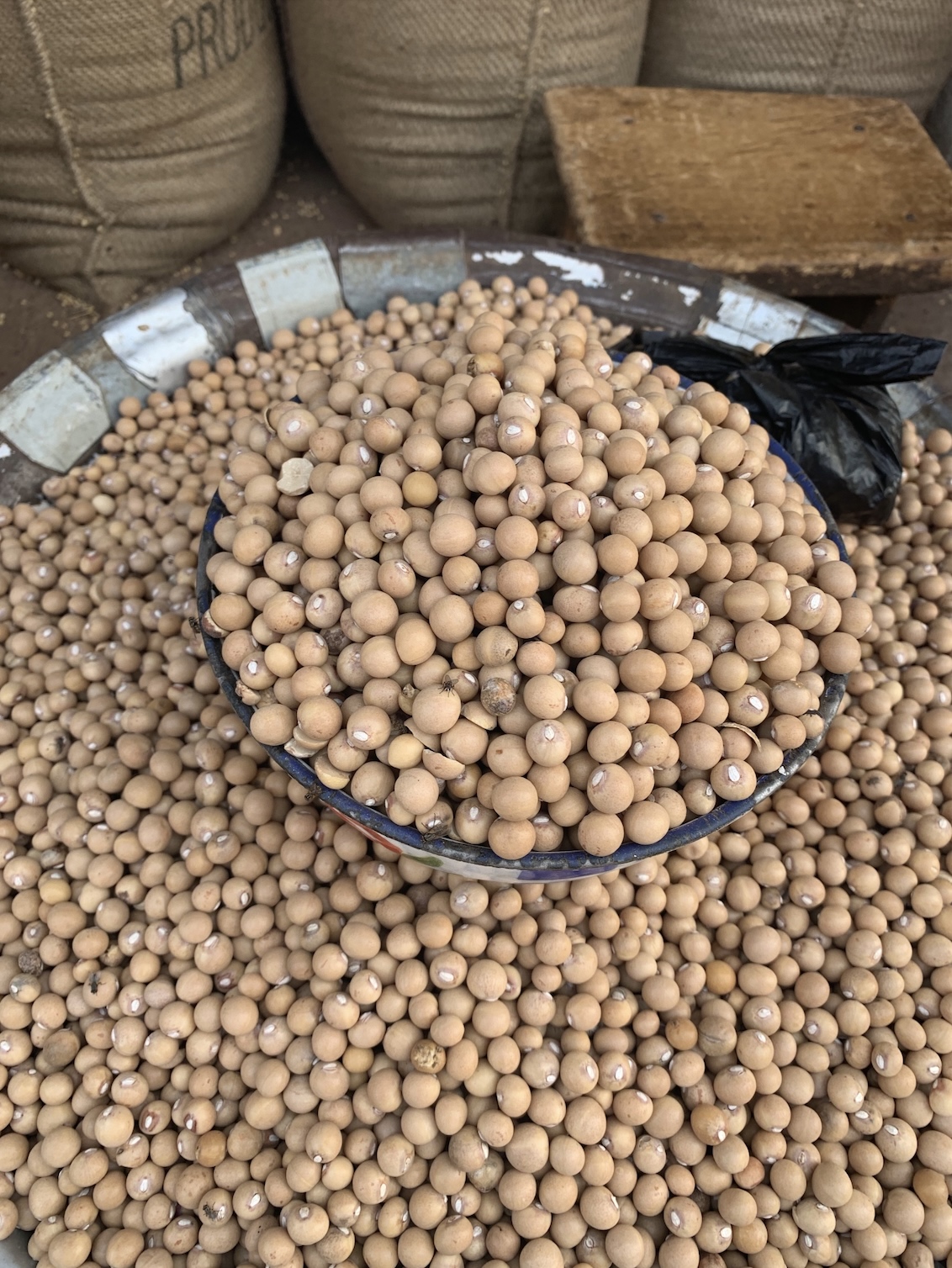
Over the last several years, we’ve watched the plant milk market grow from soy and almond to hemp seed, peas and everything in between. Today, we are focusing on the Bambara groundnut, a nutrient-dense legume originating in West Africa, first brought to our attention by WhatIF Foods. They’ve partnered with more than 50 communities around Tamale in Ghana where there are more than 6,500 registered farmers, all following regenerative agricultural practices to produce the plant used in BAMnut Milk (available in Airy, Everyday and Barista) and BAMnut (instant) Noodles. Below, Co-Founder & CEO Christoph Langwallner breaks down the nutritional and environmental benefits in each.
How did your own journey toward plant-based food begin?
I grew up on a farm in Austria, with my early life steeped in agriculture. My family’s multifaceted business encompassed farming, dairy operations, and a traditional restaurant, which instilled in me a deep appreciation for authentic food and community. I went on to study agriculture, food science and technology, and subsequently completed my MBA. Having been in the agrifood industry for over 25 years, I became acutely aware of challenges and paradoxes in the food industry. My natural curiosity and propensity for entrepreneurialism led me to develop the Nutritional Paradox and use that as a platform to share more about the issues the industry faces.
I recognize that our modern agrifood industry was developed post-war to feed an impoverished, undernourished population, but over the years none of this has changed. Whilst that may have been a solution for that time, this model is now becoming more and more destructive as it becomes more efficient and reliant on dangerous chemical inputs. Our food processors today are driven by a single bottom line, and simply putting in place sustainability measures is no longer enough. We have to do more to regenerate our soil, redesign our food system holistically, and reconnect with our farming communities. That is why I started WhatIF Foods which is aiming to be a solution toward these challenges, looking at changing the food system from the ground up, literally.
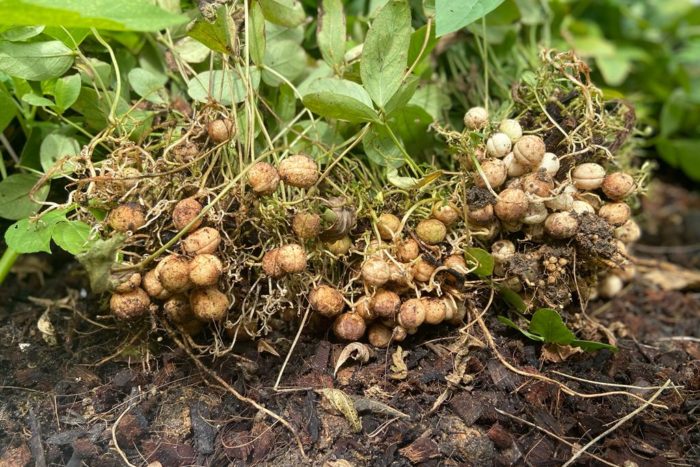
What is a Bambara groundnut?
The Bambara groundnut, also known as BAMnut, is a remarkable legume that plays a crucial role in addressing sustainability challenges in our global food system. It’s often referred to as a “complete food” due to its balanced macronutrient composition, containing approximately 64.4% carbohydrates, 23.6% protein, 6.5% fat, and 5.5% fiber. (Tan et al 2020) This legume is particularly vital for female subsistence farmers, its main processors, and cultivators. Known for its resilience in poor-quality soils and during droughts, the BAMnut is grown similarly to peanuts, with slow germination that takes place underground.
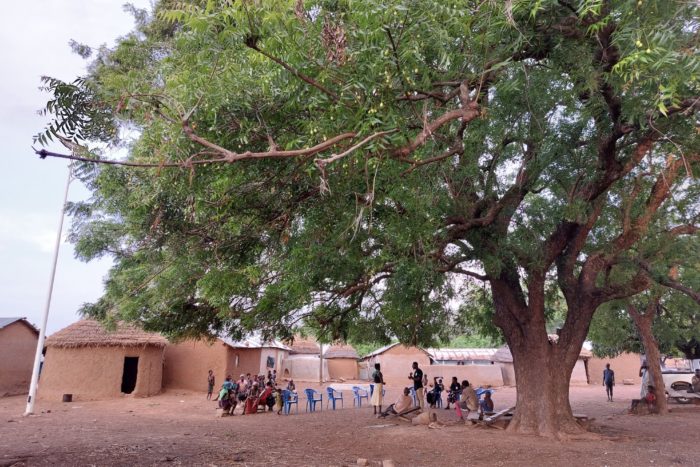
Where are you sourcing your Bambara groundnuts and how are you supporting farming communities?
WhatIF is proud to partner with over 50 communities around Tamale in Ghana’s northern region. Since February 2022, we’ve collaborated with these communities, with 980 farmers planting BAMnut in their fields in the first year. Now, we have over 6,500 registered farmers from our partner communities and new regions, with thousands more on our waitlist. Through these partnerships, we’ve introduced agrobiodiversity into local diets, empowered farmers with education about regenerative agricultural practices, and built a supply chain from the ground up, reconnecting farmers with the food system and promoting profitable farming.
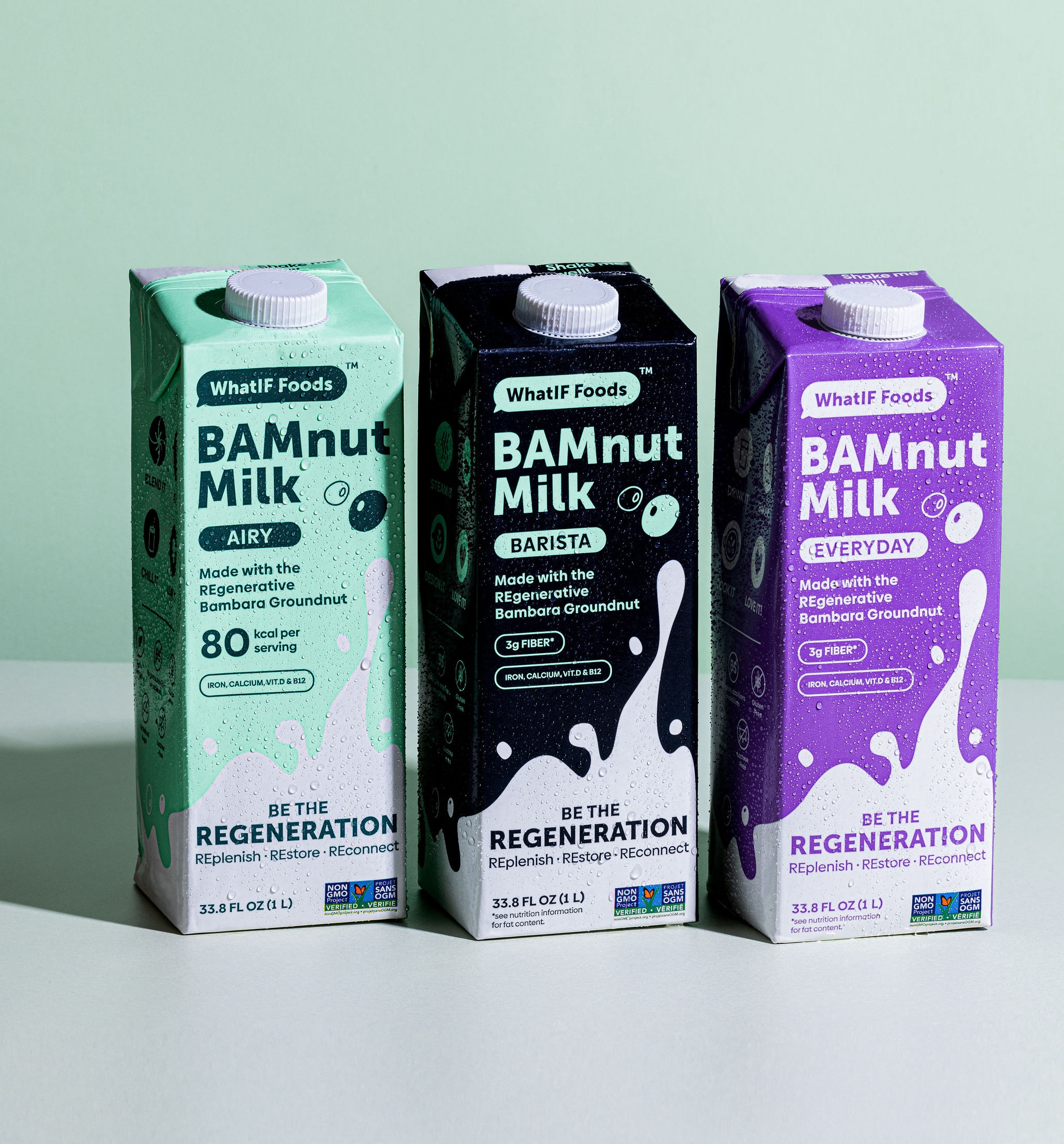
What is the difference between BAMnut Milk Airy, Everyday, and Barista?
They to cater to various occasions of use. BAMnut Everyday milk is a classic choice with a nutty flavor, perfect for both sweet and savory applications, great on its own, with cereals and in baking. BAMnut Airy milk, is the lower calorie option, ideal for smoothies, shakes, and cocktails. Our BAMnut Barista milk is designed for coffee and tea lovers, offering a creamy texture that froths beautifully for lattes and cappuccinos and is also great in curries!
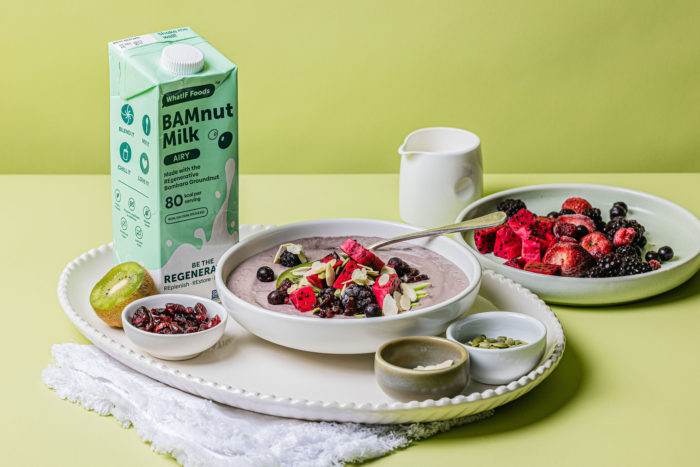
How does BAMnut compare to other nut milks on the market?
Our BAMnut milk contains only three ingredients: BAMnut, water, and coconut oil, yet it’s packed with essential nutrients. All of our milk contains vitamins D and B12, calcium, and 33% of your daily iron with no added sugar. Compared to other kinds of plant milk, BAMnut milk offers up to 3 times the fiber of oat or almond milk, double the protein content, and significantly lower carbon emissions and water usage. Our milk uses up to 24 times less water than other plant milk, and the carbon emissions are half of those for oat milk and 35% less than almond milk. Our commitment to sustainability and nutrition drives us to create a superior plant-based milk option than what’s most widely available today.
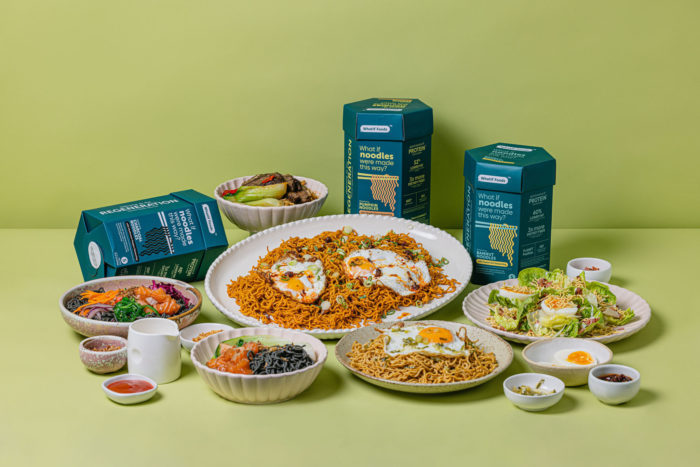
What’s special about your noodles and what led you to adding noodles to your line of products?
WhatIF Foods started as a technology incubator and has transformed into a climate tech company advancing the food industry by combining nutrient-dense food products with regenerative agriculture. Our patented air-frying technology sets our instant noodles apart, allowing us to create a healthier alternative without palm oil or deep frying while preserving flavor. Looking ahead, we’re exploring opportunities to expand our product range beyond milk and noodles, aligning with our mission to transform the food industry from the ground up, category by category.

Your website says that the noodles contain more protein than two boiled eggs. What is the source of protein?
One serving of our noodles contains a substantial 17 grams of plant-powered protein, equivalent to the protein content of 2 large eggs. The source of protein in our noodles is a combination of the nutrient-dense BAMnut, peas, and wheat. This protein blend contributes to the noodles’ nutritional superiority compared to others on the market.
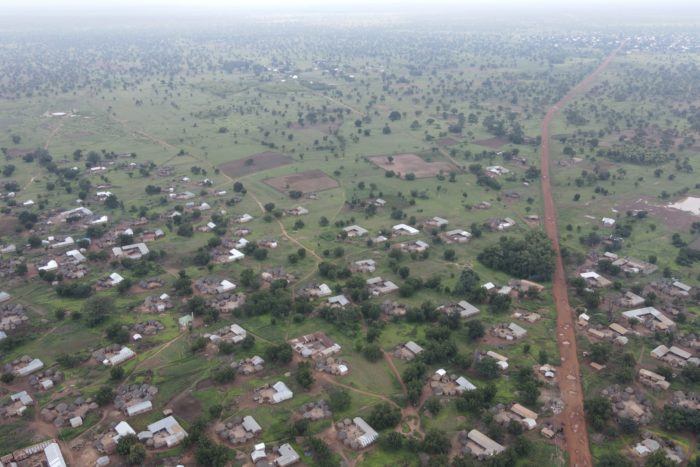
What are you most concerned about right now?
Unfortunately, the younger generation has essentially grown up from one crisis into the next, from 9/11 to the financial crisis, the Arab Spring, right through to COVID-19 and now raging wars. At the same time, there are communities as well as entire countries that are divided and driven apart by generalizations and ideologies, and that causes too many people in echo chambers unwilling to listen to each other. My biggest worry is that we will struggle to find common ground that unites communities and countries to combat some of the biggest challenges humanity has ever faced; which include a changing climate, food insecurity, non-communicable diseases, and the shift in the attention economy away from profound journalism into social media soundbites.
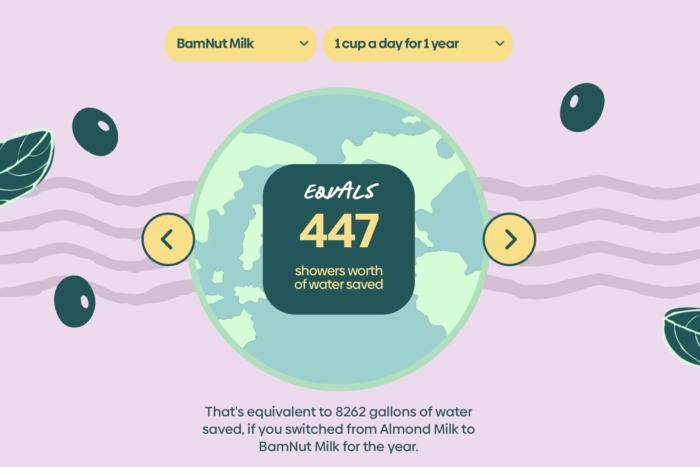
How are younger generations leading the way to food systems change?Younger generations are acutely aware of climate change and its relationship with our food systems, and they are playing a pivotal role in driving food systems change. They understand that food production and consumption play a significant role in greenhouse gas emissions and are widely cited for having high rates of plant-based diets (The Food Institute, VEGWORLD Magazine, VegNews).
We must not underestimate the massive power that young consumers are going to have as they come of age to cast their vote, not only politically but with their wallets, in the products they choose to purchase. Every purchase decision a consumer makes is intrinsically a vote.

